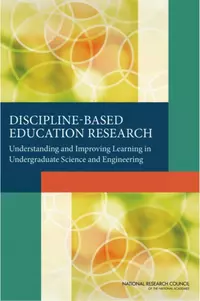GER Introductory Reading and Materials
Introductory Reports and Papers, and Webinars
- 25 Years of Progress in Geoscience Education: Major events, reports, and resources that have provided the vision and laid the foundation for 25 years of progress in geoscience education, by D. Mogk.
- Bringing Research on Learning to the Geosciences (i.e., the Wingspread report (Acrobat (PDF) 879kB Sep3 16)), (2003) by C.A. Manduca, D. Mogk, and N. Stilling.
- How Geoscientists Think and Learn (2009) Kastens, K., C.A. Manduca, C. Cervato, R. Frodeman, C. Goodwin, L.S. Lieben, D.W. Mogk, T.C. Spangler, N.A. Stillings, and S. Titus, Eos Trans. AGU, 90(31), 265.
- Earth and Mind II: A Synthesis of Research on Thinking and Learning in the Geosciences (2012) Edited by K. Kastens, and C.A. Manduca, GSA Special Paper 486.
- Slater, T.F., Slater, S.J., and Bailey, J.M., (2011). Discipline Based Education Research: A Guide for Scientists. Freeman, 211p.
- Discipline-Based Education Research and Geoscience: Webinar by Kim Kastens and David Mogk
- Discipline-Based Education Research (DBER) Understanding and Improving Learning in Undergraduate Science and Engineering: Contributions and Opportunities for the Geosciences developed by David Mogk
- Creating a Community of Practice Around Geoscience Education Research: NAGT-GER (2015) by Laura A. Lukes, Nicole D. LaDue, Kim A. Cheek, Katherine Ryker, and Kristen St. John , Journal of Geoscience Education. Full Text PDF (Acrobat (PDF) 103kB Jul5 15)
Findings from GER Community Focus Groups and Surveys
- Outcome documents from the 2015 workshop on Synthesizing Geoscience Education Research: Where are we? What is the path forward?:
- First Steps Toward Synthesizing Geoscience Education Research (Acrobat (PDF) 342kB May27 16)
- Future Directions and Priorities of Geoscience Education Research (Acrobat (PDF) 247kB May27 16)
- Results from the Geoscience Education Research (GER) Survey - Data for Setting Priorities in the GER Community: Webinar by Kristen St. John, Karen McNeal, Heather Macdonald, and Kim Kastens
Resources from the National Research Council

Susan R. Singer, Natalie R. Nielsen, and Heidi A. Schweingruber, Editors; Committee on the Status, Contributions, and Future Directions of Discipline-Based Education Research; Board on Science Education; Division of Behavioral and Social Sciences and Education; National Research Council
The National Science Foundation funded a synthesis study on the status, contributions, and future direction of discipline-based education research (DBER) in physics, biological sciences, geosciences, and chemistry. DBER combines knowledge of teaching and learning with deep knowledge of discipline-specific science content. It describes the discipline-specific difficulties learners face and the specialized intellectual and instructional resources that can facilitate student understanding.

Nancy Kober; Board on Science Education; Division on Behavioral and Social Sciences and Education; National Research Council
The undergraduate years are a turning point in producing scientifically literate citizens and future scientists and engineers. Evidence from research about how students learn science and engineering shows that teaching strategies that motivate and engage students will improve their learning. So how do students best learn science and engineering? Are there ways of thinking that hinder or help their learning process? Which teaching strategies are most effective in developing their knowledge and skills? And how can practitioners apply these strategies to their own courses or suggest new approaches within their departments or institutions? Reaching Students strives to answer these questions.
Papers commissioned for the DBER report that include the following (2010-2011):
- Promoting Evidence-Based Change In Undergraduate Science Education by Ann Austin
- The Role of Spatial Thinking in Undergraduate Science Education by Mary Hegarty
- A New Century For Geoscience Education Research by Michael Piburn, Kaatje van der Hoeven Kraft, and Heather Pacheco
Board on Science Education Commissioned Papers (2008) for the Promising Practices in Undergraduate Science, Technology, Engineering, and Mathematics (STEM) Education (2011)
- Concept Inventories in Higher Education Science by Julie Libarkin
- Working with the Discipline – Developing a Supportive Environment for Education by Cathy Manduca
- Less Talk, More Action: Active Learning in Introductory Geoscience Courses by David McConnell
- The Role of Undergraduate Research in Student Retention, Academic Engagement, and the Pursuit of Graduate Education by Sandy Gregerman
Framework for K-12 Science Education: Practices, Crosscutting Concepts, and Core Ideas , (2002).
Other Resources
- IRIS Encouraging Networks between Geoscience and geoscience Education (ENGAGE) Workshop and report.
This workshop was designed to catalyze relationships, understandings, and collaborations between early career disciplinary researchers in the earth, atmospheric, ocean, and polar sciences and scientific discipline based education researchers (DBERs) in the geosciences. - Lewis, E. and D.R. Baker (2009). A Call for a New Geoscience Education Research Agenda. Journal of Research in Science Teaching 47:2 (2010), pp. 121–129.
The authors pose research questions, highligh sociocultural theories, and provide examples of other science education research as possible avenues by which to explore the interrelated problems facing geoscience education at the secondary and tertiary levels. - NAGT Geoscience Education Research Division
- Dexter Perkins (2004) Scholarship of Teaching and Learning, Assessment, and the Journal of Geoscience Education. Journal of Geoscience Education
- Anthony D. Feig (2013) The Allochthon of Misfit Toys. Journal of Geoscience Education
- National Science Foundation, Common Guidelines for Education Research and Development
